The man in charge of Silicon Valley's watercooler
- Published
- comments
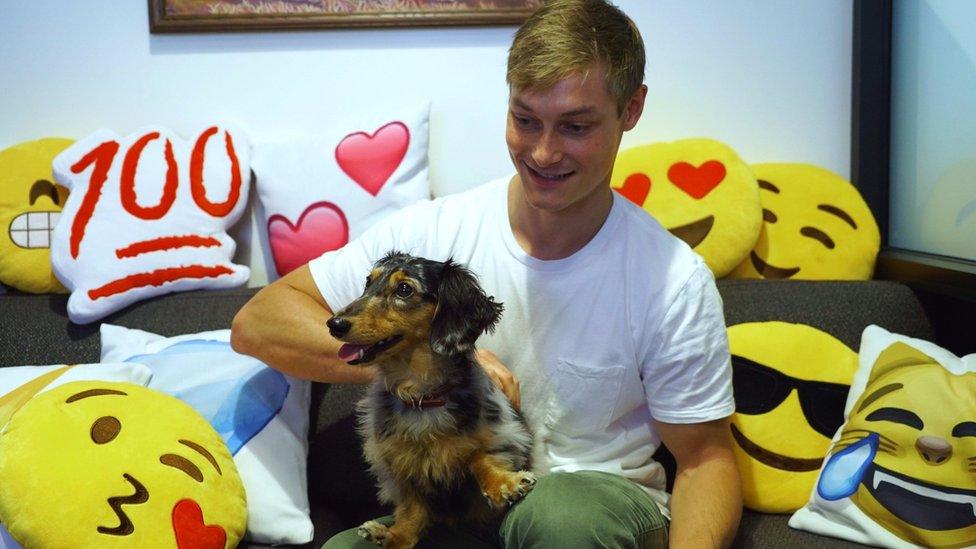
Ryan Hoover and Pluto, the Product Hunt office dog
Three years ago Ryan Hoover set up an email newsletter with the goal of finding and sharing the next big thing. Turned out, it was him.
His website, Product Hunt, has quickly evolved from that newsletter into the tech scene’s number one shop window for new ideas. It’s long been a must-read in San Francisco where to gain buzz, even for only an afternoon, means a real chance of success.
Like all good ideas, the site’s mechanics are straight-forward. Users submit products - the categories right now are tech, games, podcasts and books - and they are voted up (or not) by the community. The best rise to the top, the rest drift away back to the drawing board.
Those recommendations are a mixed bag. As I type this, the top suggestions range from a voice chatbot that can help you learn a foreign language - smart! - to a contraption that turns any pair of shoes into roller skates.
Ironically, on the morning I spent with Hoover and his geographically-splattered team, one of the top “hunts” was for Self Control, a Mac application to help you avoid distracting websites. Let me tell you, few out there are as distracting as Product Hunt, a site that behaves just like the city it’s a part of, thriving on a blend of the ridiculous and brilliant.

The team works from a co-working space in downtown San Francisco
As a temporary measure, the team is based in a co-working space in San Francisco’s financial district. When I arrived, the team was about to have its Monday meeting.
The site’s chief technology officer, Andreas Klinger, an Austrian, chairs the conference call which spans across the ocean - staff in Bulgaria, Belgium, Britain and spread out across the US are, in what is the finest advert for teleworking I’ve ever seen, discussing changes to the site that are coming thick and fast.
One is a complete reworking of the site’s jobs page - a redesign from head-to-toe - aimed at helping them to make a quick buck from what has been an unexpectedly high demand in tech companies wanting to use Product Hunt to recruit people as well as impress them.
It is, as Klinger pointed out, “an easy way to make money” for Product Hunt. And after receiving $7.1m (£5.4m) in funding, the pressure and expectation to turn the site’s popularity into real cash is mounting - though Hoover has more than a few ideas of how to make that happen.
Playful
Hoover, 29, is from Eugene, Oregon, a city famous as being the birthplace of Nike. His father is a serial entrepreneur, with one venture being a video game store a 14-year-old Hoover worked in.
“The smell of Windex still brings me back, I would be cleaning the counter tops and everything,” he jokes.
After college, and a brief stint in Portland, Oregon, Hoover found himself making the typical tech pilgrimage to San Francisco. But in some respects, that’s where his similarity with most start-up founders you’ll encounter ends. Hoover has seemingly dodged many rites of passage on his way to success: there are no failures, no dramatic moment of ditching a high-paying job with a tech giant, no sleeping on the floor in a friend’s apartment while he struggled to get his new ideas moving.
Instead, Product Hunt has lived a rather charmed life - starting as a newsletter of things Hoover was interested in, and then gradually morphing into the site it is today via support from Y Combinator, the same start-up incubator responsible for giving leg-ups to AirBnB, Dropbox and Reddit.
But Hoover’s biggest worry wasn’t attracting funding to get things up and running - but rather that he might not enjoy working on the idea.
“I took several weeks to think through, do I want to work on this for a decade?” he says.
“That was super important for me to acknowledge. You can’t quit when you start a start-up. You sign a contract saying I’m going to work on this thing. It’s a little different to a two-weeks' notice in a job.”
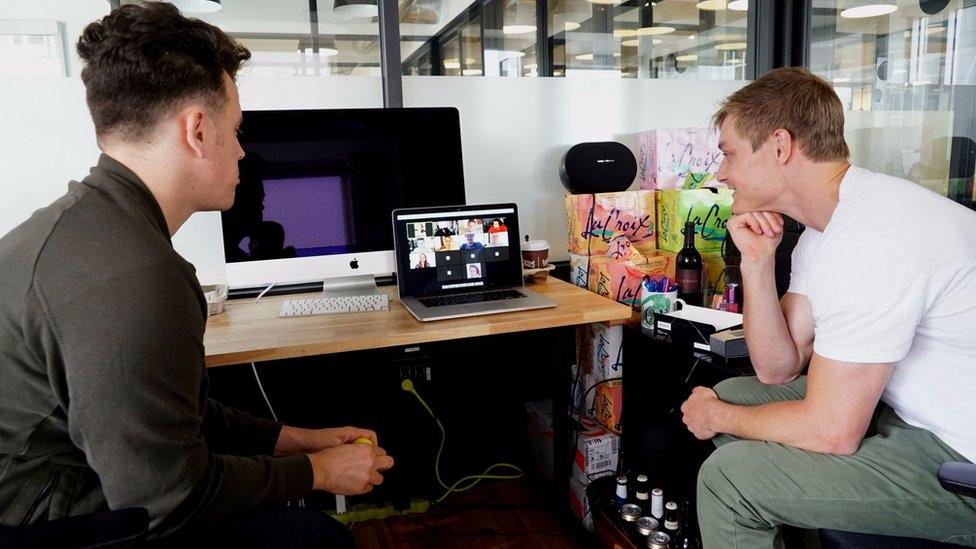
Product Hunt's team is spread out across the world
But the key to Product Hunt’s success, I’ve been told, is closely linked to the playful humour pushed by Hoover and his team, which is evident throughout the site and its social media persona.
“You come for the products, but you stay for the community,” says Eric Willis, an entrepreneur who closely tracks what happens to companies once they’re featured on Product Hunt.
When products are posted to the site, the people responsible for creating the idea go into what I’d describe as the kitten’s den - an open and brutally honest forum to discuss the project with potential users, but one that is remarkably friendly.
“Unlike places like Hacker News, the energy is resoundingly positive,” Willis says.
“A lot of that is attributed to Ryan and the early founding team. The ‘positivity’ started there and set the tone.”
But most appealing of all, Willis says, is that it means publicity for start-ups is no longer controlled by a limited group of tech bloggers and journalists, removing a gateway that many in tech felt could be unfair and unforgiving.
A deal with Amazon
Then again, that lack of cynicism has given rise to what must surely be the biggest collection of solutions to first-world problems ever assembled.
There are 131 posts related to coffee, for instance. And 36 different “innovative” backpacks. Within the 125 on-demand services listed, some really expand your understanding of laziness - like Booster Fuel, a service which sends someone to your place of work to stick some petrol in your car. Or Send Your Mother a Letter, which sends your mother a letter.
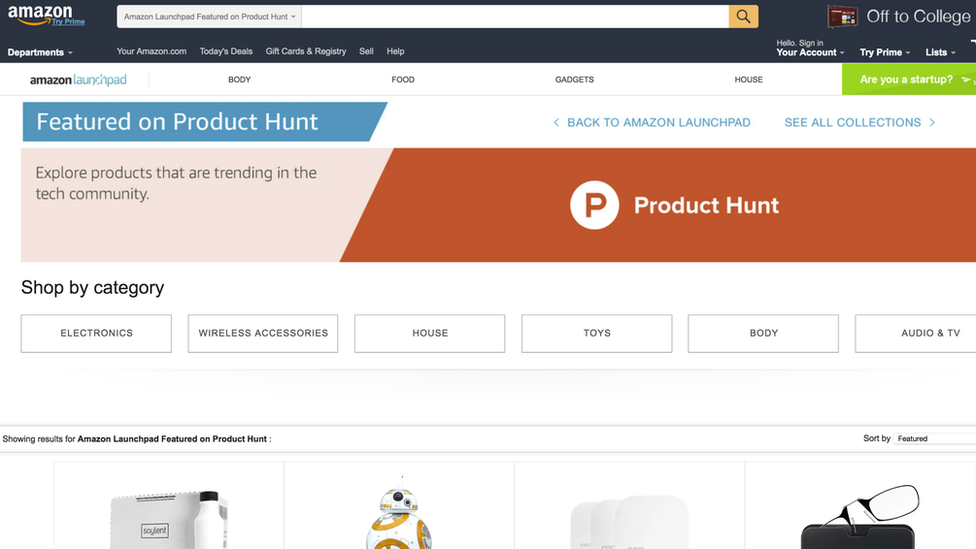
Amazon has partnered with the firm on a curated section on the retail site
Hoover didn’t want to talk too deeply about metrics, such as how many people visit Product Hunt, and the types of people they are, but given the most popular ever product on the site is a directory of resources for people wanting to launch a start-up, it’s fairly clear where Product Hunt’s core audience lies. If it’s to live up to the valuation given to it by investors, it will need to diversify greatly.
To do that it’ll need help, which is where partnerships come in. Earlier this month, Product Hunt announced it was working with Amazon on a specially-curated section of the retail giant’s site.
A branded Product Hunt section on Amazon shows products that have been trending with the site’s community, with a link to buy them. Product Hunt picks up a slice of the earnings from each sale.
These products were of course already on Amazon - but it’s that seal of approval among the tech community that spurs purchasing.
Product Hunt also has its own shop to sell gear through, and it is one of the various ways the site is making small amounts of money.
Eventually, the plan is to incorporate sponsored posts and content - but very delicately, as to not disrupt the feeling of organic success on the site.
“We’re going to start with making money very soon,” Hoover says.
“But we don’t need to be profitable tomorrow. We’re at the right pace.”
Email 2.0
In the short term, Hoover and team are concentrating on incremental improvements. Last week the site launched a new personalised email newsletter.
“Email has always been perceived as being dead,” Hoover explains.
“But it’s what people open up first thing in the morning. It’s far from dead. What’s great about this email is that it’s going back to our roots, but better.”
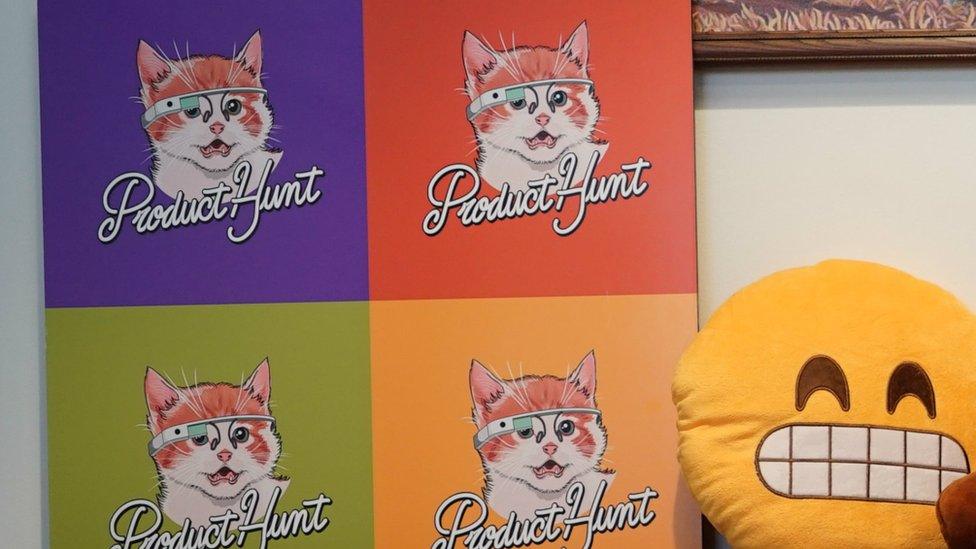
Product Hunt is visited by some of San Francisco's most influential and wealthy investors
The email takes into account who you follow on the site and what your interests are, and so each user will get a morning newsletter showing them products that may be niche to the wider audience but suited perfectly to them.
This approach is all about scaling, Hoover says. Right now, Product Hunt is only useful because it is limited - only 11 or so products at any given time are given the prime top spot on the site’s homepage. If the site was swamped with submissions, the effect of being “big” on Product Hunt would be diluted, defeating the point entirely. But personalised emails mean people who are particularly bothered about ideas relating to coding will see more of that.
“It’s the gems that may not have been in the top 10, but may be interesting to you,” Hoover explains.
“We spent a lot of time on it. This is one of our bigger projects. We’ve been working on it… I don’t know… six weeks?”
Six weeks isn’t exactly a long time, I suggest.
“For us it is.”
Friends in wealthy places
Two years ago there was an app called Yo. It was ludicrous. All it did was allow you to send “yo” to a friend at the tap of a button.
For a brief moment, it caught on - the absurdity grabbed people’s imagination. And, on Product Hunt, it rose to the top. Around a month later it closed a deal to get a $1m investment.
And then there was TapTalk, an photo and video sharing app, which was spotted on the site by investment firm SV Angel, who later stumped up the cash to up its development.
It is difficult to measure how influential a good outing on Product Hunt can be - but many start-ups see the site as one of the valuable shop windows out there. In a city often hated for its wealthy cliques, Product Hunt seems to be providing a level-playing field for good start-ups.
The site won’t be resting on its first three years of growth. Aside from the email newsletter and better job advertising, Hoover is looking to produce tools to help with the development process itself, in the hope of making Product Hunt an indispensable tool.
“In a decade I’ll tell you if it worked or not,” Hoover says.
Follow Dave Lee on Twitter @DaveLeeBBC, external and on Facebook, external
- Published20 June 2014
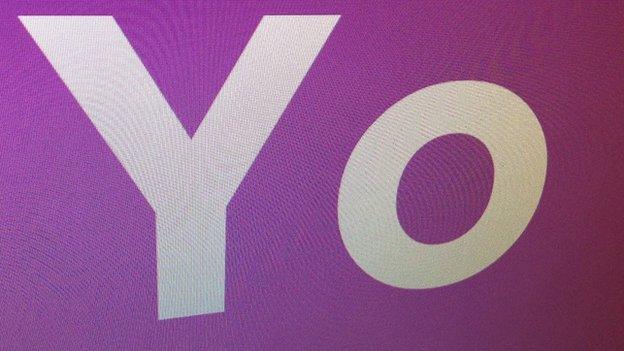
- Published11 January 2016